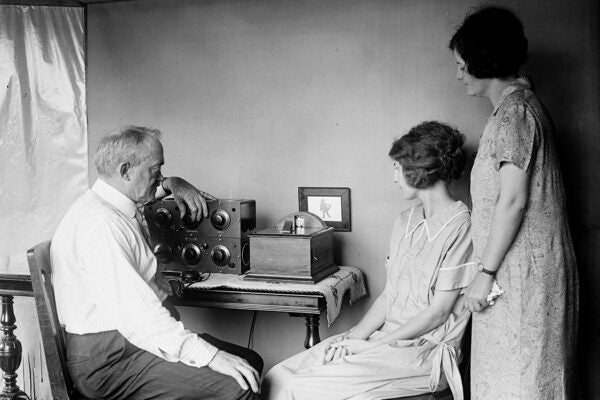On May 13, 2019, the Supreme Court gave its blessing to a class action suit against Apple’s App Store, just a few days after Facebook co-founder Chris Hughes called for a forced break-up of the social networking giant, and just a couple of weeks after it was revealed that Apple has been driving parental controls and screen time management apps off its platform. Together, these events amount to a powerful argument in favor of breaking up the App Store, and creating genuine competition in the market for mobile apps by allowing developers to sell mobile apps directly to iPhone and iPad users.
There are three major reasons why breaking Apple’s control over the app marketplace would be good for consumers, businesses, and society as a whole. First, it would lower prices—potentially not just for apps, but for smartphones themselves. Second, it would foster innovation, so that consumers could enjoy a wider range of app choices. Third, and most importantly, it would dramatically reduce Apple’s power and influence over the mobile app ecosystem. The company currently has far too much control over smartphone users’ tech choices and freedom of expression.
Price
Let’s start with pricing—the issue at the heart of last week’s Supreme Court decision in Apple Inc. v. Pepper. The suit challenged Apple’s business model, which requires that all iPhone or iPad apps be sold through its official App Store, in which software developers pay Apple a 30% commission on all app sales. The plaintiffs in the case, a group of iPhone users, argued that this amounts to a 30% surcharge on their app purchases. Apple claimed that the plaintiffs had no standing to file a lawsuit, because they’re not Apple’s customers; rather, they’re the customer of the developers selling each app. The Supreme Court held that under Apple’s business model, app purchasers are de facto Apple customers, and therefore entitled to sue Apple for driving up prices with its business model.
But simply focusing on the price of individual apps may understate the impact that Apple’s business model has on consumer pocketbooks. As Michael K. Cheng points out in “iPhone Jailbreaking Under the DMCA,” the App Store model creates a form of technological “lock-in” for smartphone purchases, making it harder for them to switch to other smartphones. Quoting the Linux Information Project, Cheng notes:
A lock-in is a type of relationship where consumers “are dependent on a single manufacturer or supplier for some product (i.e., a good or service) and cannot move to another vendor without substantial costs.” Cheng notes that the requirement that all iOS apps be sold through the App Store locks consumers into buying their apps directly from Apple (unless they undertake the somewhat daunting job of jailbreaking their phones).
The impact of that lock-in goes beyond tying consumers to the App Store, however. It also ties consumers to the iPhone (or iPad) itself. If developers could sell apps directly to iPhone users, they could offer consumers a software license that would let them use the same app on any smartphone: If you purchased a game to play on your iPhone, but later switched to an Android phone, you could take your game with you. (This is the vision behind Mozilla’s effort at launching an open, web-based app store, several years ago.)
Without that option, iPhone users aren’t just locked into the App Store—we’re locked into the iPhone, because switching to another phone platform means re-purchasing all your apps. (And if you buy apps like I buy apps, that could cost hundreds of dollars). By locking consumers into the App Store, Apple locks them into the iPhone, or at least makes it more expensive to switch. That means the App Store business model doesn’t just drive up app prices. It also drives up iPhone prices, because it insulates Apple from competitive pressures, and makes consumers prisoners of ever higher phone prices, which they will abide just to avoid the cost of rebuilding their app collection. Break Apple’s stranglehold on the app market, and you create downward pressure on iPhone and iPad pricing.
Innovation
Breaking up the App Store would also foster innovation. In their 2012 article “Product survival analysis for the App Store”, Euy-Young Jung, Chulwoo Baek, and Jeong-Dong Lee argue that the App Store lowered barriers to entry for would-be mobile app makers:
because of the free Software Development Kit (SDK) and low marketing costs. Ordinary people can develop Apps using SDK in only months, and newly developed Apps can be introduced to users through several lists, including “New and Noteworthy,” “What’s Hot,” and “Top 25.” Therefore, startup costs, including development and marketing costs, have been substantially lowered compared with the ordinary software industry.
In the same article, however, the authors note that getting on Apple’s bestseller charts can make or break an app, since “sales are significantly affected by an App’s degree of exposure to consumers.” Apple exercises more and more discretion over which apps get that kind of exposure, however, since its App Store now includes not just bestseller lists, but lists of recommendations from Apple’s own team. Appearing in a list like “Apps We Love Right Now,” or in one of the app stories on the App Store home page, offers an app an enormous boost. Conversely, missing out on that exposure can be a fatal blow. The App Store monopoly gives Apple the exclusive power to put its finger on the scales—creating an unpredictable situation for would-be developers. Without knowing whether you’ll get Apple’s blessing, it’s hard to know how much to invest in developing (or improving) an app. An open market for mobile apps would give developers greater transparency and predictability, and encourage more innovation in the market.
Freedom
Finally, breaking up Apple’s control over the mobile app market is essential to ensuring freedom of choice for tech consumers, both in America and beyond. In 2013’s “The Great App Firewall,” Isaac Stone Fish revealed the way Apple aligned its App Store with Chinese censorship policies in order to make the App Store available to Chinese consumers. Fish observed:
Apple, unlike Google, has never publicly explained its censorship policies in the Middle Kingdom. In a rare example to have made it into the English-language media Apple told a developer in April that his online bookstore app had to be removed because it “includes content that is illegal in China.”
But it’s not like China is the only place Apple’s App Store monopoly limits consumer choice. We can see the inhibiting effects of Apple’s outsize influence in the way the company has recently exercised its power over parental controls and screen-time management apps. The New York Times recently revealed that Apple has curtailed at least eleven different parental control and screen-time management tools (either kicking them off the App Store or requiring them to trim their features), just in the months since Apple rolled out its own Screentime tool.
As I wrote in Medium’s OneZero, this decision falls hardest on special needs families (like mine) that rely on third party app developers to create solutions that suit our children’s particular needs. But Apple’s App Store monopoly gives it the power to cut off any app that competes with its own vision for the platform—or its own business interests. This means that even if there’s a market for third-party parental controls, Apple can kill those tools at any time.
Weekly Digest
We wouldn’t put up with a government that arbitrarily hiked prices, stifled innovation, or exercised veto power over which software we can or can’t put on our phone. But Apple enjoys that exact power, without any form of electoral accountability to the users its decisions affect. Yes, we can always leave the platform—but the lock-in effects of Apple’s business model make that an extremely costly decision.
That’s exactly why it’s time for regulators to step in, just as Chris Hughes argues they should step in and break up Facebook. The Federal Trade Commission should recognize that the App Store is an anti-competitive monopoly, and one that is bad for both consumers and for the software development industry. If the App Store is the only place consumers can buy apps, it needs to be managed by an independent company that does not itself sell apps or devices to consumers—so that there’s no incentive to play gatekeeper, stifle competition, or drive up iPhone prices. Better yet, let’s eliminate the requirement to sell all apps through the App Store, and allow consumers to decide where, when, and how they’ll get software for their phones.







